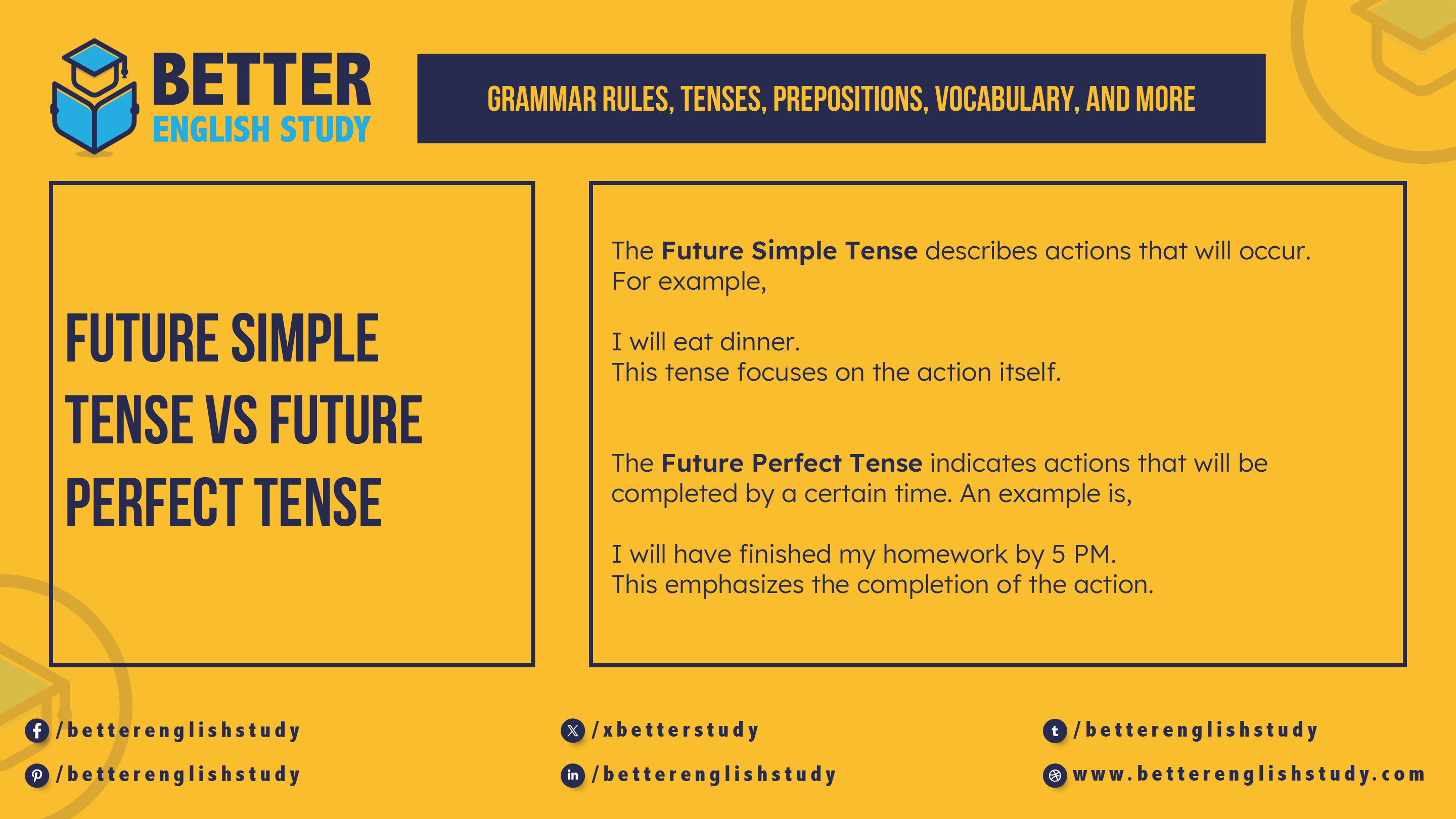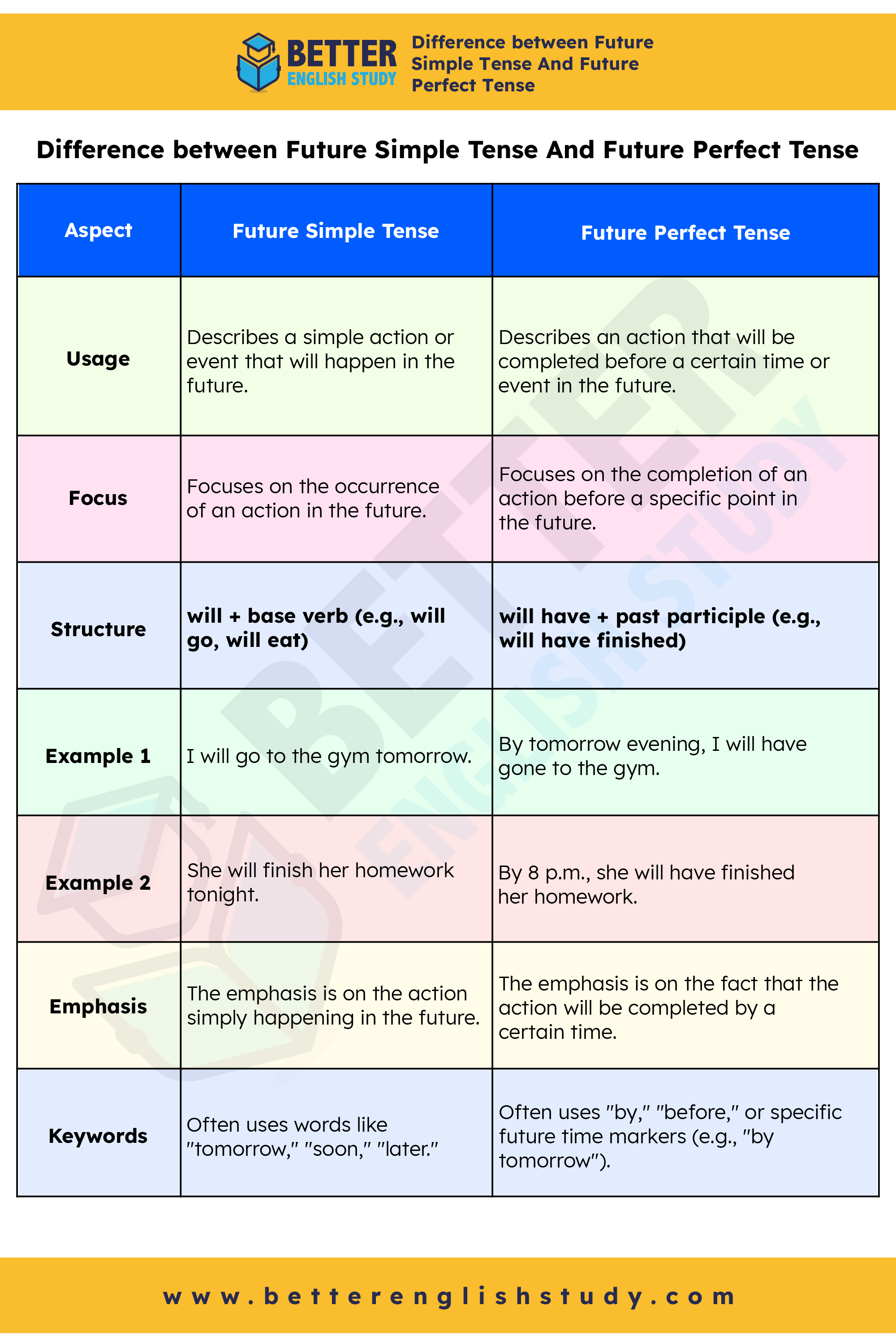
The Future Simple tense indicates actions that will happen, while the Future Perfect tense describes actions that will be completed before a specified time in the future. For example, “I will finish my homework” shows Future Simple, whereas “I will have finished my homework by 5 PM” illustrates Future Perfect.
Understanding the differences between tenses is crucial for mastering English grammar. Tenses convey not just time, but also the nature of actions. The Future Simple tense is straightforward and commonly used for predictions or plans. In contrast, the Future Perfect tense adds complexity by focusing on the completion of actions relative to a future point.
Knowing when to use each tense enhances clarity in communication, making your writing more effective and precise.
Introduction To Future Tenses
Understanding future tenses is essential for clear communication. They express actions that will happen later. Two common types are Future Simple Tense and Future Perfect Tense.
The Future Simple Tense describes actions that will occur. For example, “I will eat dinner.” This tense focuses on the action itself.
The Future Perfect Tense indicates actions that will be completed by a certain time. An example is, “I will have finished my homework by 5 PM.” This emphasizes the completion of the action.
Both tenses help convey important time-related meanings. Mastering them improves writing and speaking skills. Understanding their differences is crucial for effective grammar.
Basics Of Future Simple Tense
The Future Simple Tense is used to express actions that will happen later. It is formed with “will” plus the base form of the verb. For example, “I will eat” or “She will play.” This tense indicates a decision made at the moment or a prediction about the future.
When using the Future Simple, it is common to make promises or offers. For instance, saying “I will help you” shows intention. It can also express an uncertain future event, like “It will rain tomorrow.”
Key Features Of Future Perfect Tense
The Future Perfect Tense shows actions that will be completed before a certain time. It is formed with “will have” plus the past participle of the main verb.
For example, “She will have finished her homework by 5 PM.” This indicates completion by a specific time.
| Subject | Will Have | Past Participle |
|---|---|---|
| I | will have | seen |
| They | will have | completed |
| She | will have | visited |
Use the Future Perfect Tense for actions that will finish by a certain moment. It often answers questions like, “What will have happened by then?”

Difference between Future Simple Tense And Future Perfect Tense
| Aspect | Future Simple Tense | Future Perfect Tense |
|---|---|---|
| Usage | Describes a simple action or event that will happen in the future. | Describes an action that will be completed before a certain time or event in the future. |
| Focus | Focuses on the occurrence of an action in the future. | Focuses on the completion of an action before a specific point in the future. |
| Structure | will + base verb (e.g., will go, will eat) | will have + past participle (e.g., will have finished) |
| Example 1 | I will go to the gym tomorrow. | By tomorrow evening, I will have gone to the gym. |
| Example 2 | She will finish her homework tonight. | By 8 p.m., she will have finished her homework. |
| Emphasis | The emphasis is on the action simply happening in the future. | The emphasis is on the fact that the action will be completed by a certain time. |
| Keywords | Often uses words like “tomorrow,” “soon,” “later.” | Often uses “by,” “before,” or specific future time markers (e.g., “by tomorrow”). |
- Future simple describes actions that will happen in the future.
- Future perfect focuses on actions that will be completed before a specific future time or event.
Examples In Action: Future Simple
Future Simple Tense describes actions that will happen. For example, “I will eat dinner.” This shows a planned action.
In negative sentences, the structure changes. For instance, “I will not eat dinner.” This indicates something will not happen.
Questions in Future Simple follow a different format. An example is, “Will you eat dinner?” This asks about future actions.
Examples In Action: Future Perfect
Future Perfect tense shows actions that will be completed before a certain time. For example, “I will have finished my homework by 6 PM.” This sentence indicates that the homework is done before 6 PM.
In negative sentences, it changes slightly. For instance, “She will not have arrived by noon.” This means she is still on her way.
Questions can be formed easily. For example, “Will they have completed the project by Friday?” This asks if the project is done by Friday.
Common Mistakes And Confusions
Mixing tenses can lead to confusion. Future Simple Tense describes actions that will happen. For example, “I will eat dinner.” In contrast, Future Perfect Tense talks about actions that will be complete. An example is, “I will have eaten dinner.” Both tenses serve different purposes.
Overusing one tense can cause mistakes. Relying heavily on Future Simple can make your writing dull. Using it too much may sound repetitive. On the other hand, overusing Future Perfect can confuse readers. It is important to find a balance. Understanding each tense helps in using them correctly.
Frequently Asked Questions
What Is The Future Simple Tense?
The future simple tense describes actions that will happen in the future. It’s formed using “will” or “shall” plus the base form of the verb. For example, “I will eat dinner. ” This tense expresses intentions, promises, or predictions about future events.
How Is Future Perfect Tense Formed?
The future perfect tense is formed using “will have” plus the past participle of the verb. For instance, “I will have finished my homework. ” This tense indicates that an action will be completed before a specified future time or event.
When To Use Future Simple Tense?
Use the future simple tense for spontaneous decisions or predictions. It’s ideal for situations that are uncertain or not planned in advance. For example, “I will call you later. ” This tense emphasizes immediacy or intention without a definite timeline.
When To Use Future Perfect Tense?
The future perfect tense is used to indicate actions that will be completed before a certain time in the future. For example, “By next year, I will have graduated. ” It highlights the completion of an action in relation to another future event.
Conclusion
Understanding the difference between Future Simple and Future Perfect tenses is crucial for clear communication. Future Simple expresses actions that will happen, while Future Perfect indicates actions completed by a certain time. Mastering these tenses enhances your writing skills and helps convey your ideas more effectively.
Practice using both tenses for better fluency.
